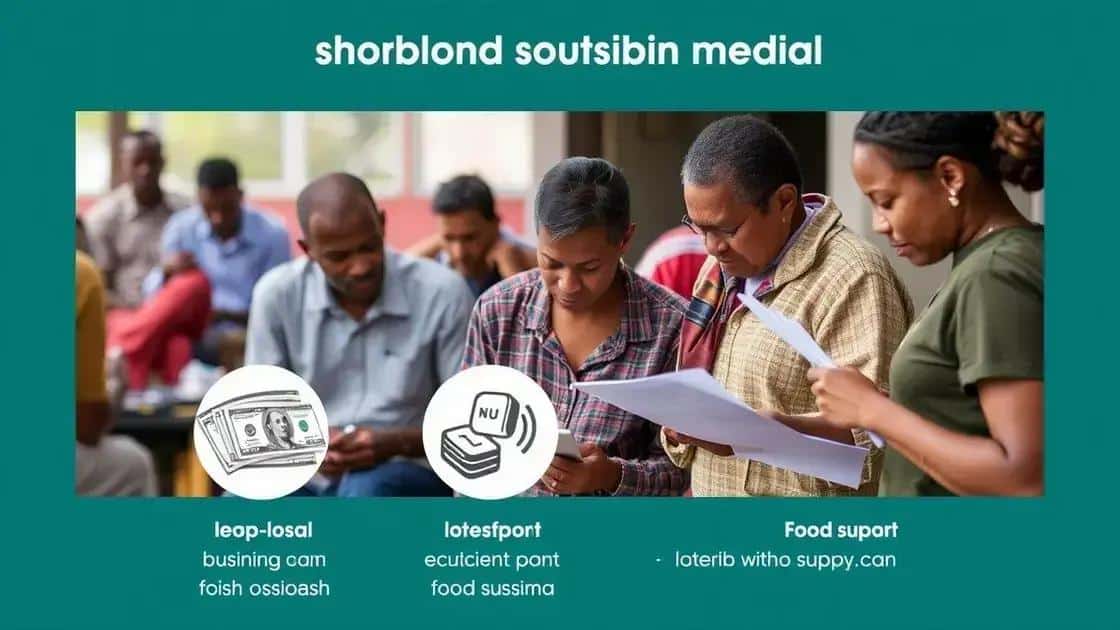Government financial assistance programs you should know

Anúncios
Government financial assistance programs provide crucial support through various forms, including cash aid, loans, and grants, helping individuals and businesses navigate financial difficulties.
Government financial assistance programs play a vital role in supporting individuals and businesses in need. Have you ever wondered how these programs can make a difference in your financial situation? Let’s explore their benefits and how to access them.
Anúncios
Understanding government financial assistance programs
Understanding government financial assistance programs is essential for anyone seeking support in tough times. These programs can provide individuals and businesses with critical resources, especially in times of economic uncertainty. Let’s dive deeper into what these programs offer and how they can be beneficial to you.
What Are Government Financial Assistance Programs?
Government financial assistance programs are initiatives designed to provide financial help to certain groups. This includes individuals, families, and businesses facing financial hardships. They can vary widely, from subsidies for low-income families to grants for small businesses. Understanding their scope can help you identify which programs might be suitable for your needs.
Anúncios
Types of Financial Assistance Available
Several types of financial assistance programs exist, each serving distinct needs:
- Direct cash assistance for individuals and families
- Loans or grants for small businesses
- Unemployment benefits for jobless individuals
- Food assistance programs for low-income families
These various forms of support aim to alleviate financial burdens and help individuals regain stability.
Many people are surprised at the range of financial assistance available. Programs often target specific demographics, such as veterans, the elderly, or those with disabilities. If you’re unsure about your eligibility, don’t hesitate to reach out for guidance. Local government offices can assist you in understanding what options might be available to you.
Overall, accessing government financial assistance programs can greatly enhance your financial situation. By knowing what is out there, you can take proactive steps to secure the help you need. Stay informed about updates or changes to these programs as they can often evolve, especially in response to economic challenges.
Overall, understanding these programs can make a significant difference in navigating financial difficulties. Awareness is the first step toward accessing valuable resources that might be beneficial to you or your loved ones.
Types of financial assistance available
 Understanding the types of financial assistance available is crucial for accessing the right support. Many programs exist to cater to diverse needs, providing essential help to those in difficult situations.
Understanding the types of financial assistance available is crucial for accessing the right support. Many programs exist to cater to diverse needs, providing essential help to those in difficult situations.
Direct Cash Assistance
One of the most common forms of financial assistance is direct cash aid. This support often targets low-income families and individuals. Programs like Temporary Assistance for Needy Families (TANF) offer cash benefits that help cover essential expenses.
Loans and Grants for Businesses
Small businesses can benefit significantly from specific financial assistance programs. These programs may include:
- Small Business Administration (SBA) loans that provide funding at favorable rates.
- Grants that do not require repayment, available for particular projects or demographics.
- Programs aimed at minority-owned businesses to help level the playing field.
- Disaster relief funds for businesses impacted by natural disasters.
Accessing these funds can ensure a business survives during challenging times.
While cash and loans are often highlighted, other forms of assistance are equally important. Food assistance programs, for instance, help low-income families afford groceries. In many areas, the Supplemental Nutrition Assistance Program (SNAP) provides critical nutritional support to eligible recipients.
Emergency assistance is also available for families facing unexpected crises. These programs might include aid for utilities or housing in times of need, ensuring stability during tough moments. As you explore options, consider your unique situation and the types of assistance that align with your needs.
Being aware of the array of financial assistance programs can empower you to seek the support necessary to improve your circumstances. Take the time to research and connect with local resources to maximize your access to these vital programs.
Eligibility criteria for government programs
Understanding the eligibility criteria for government programs is vital for anyone seeking assistance. Each program has specific requirements that applicants must meet. Knowing these criteria can save time and enhance your chances of receiving support.
Common Eligibility Requirements
Many government assistance programs share similar eligibility conditions. These might include:
- Income level, often determined by Federal Poverty Guidelines.
- Residency status, requiring applicants to be U.S. citizens or legal residents.
- Age requirements, with some programs aimed specifically at seniors or children.
- Employment status, especially for programs supporting unemployed individuals.
These factors play a significant role in determining who qualifies for various programs, so it’s important to review them before applying.
Before starting your application, double-check the specific requirements for the program you are interested in. Some programs may require additional documentation such as proof of income or residency. Being prepared with this information can ease the process.
In some instances, the eligibility criteria may vary by location. For example, state-specific programs often have their own rules. That means it’s crucial to check local resources or government websites for the most accurate information. Additionally, some programs may have time-sensitive openings or events that could affect your eligibility.
Staying informed about changes in these programs can also help you navigate the application process more effectively. Understanding the eligibility criteria for government programs empowers you to make informed decisions and seek the assistance that best fits your needs.
How to apply for financial aid
 Applying for financial aid can seem daunting, but understanding the process makes it much simpler. Knowing how to apply can open doors to various government financial assistance programs that can provide the support you need.
Applying for financial aid can seem daunting, but understanding the process makes it much simpler. Knowing how to apply can open doors to various government financial assistance programs that can provide the support you need.
Gather Necessary Documents
Before starting your application, it’s essential to gather all required documents. This includes:
- Proof of income, such as pay stubs or tax returns.
- Identification documents, like a driver’s license or Social Security card.
- Residency verification, which may involve utility bills or leases.
- Completed application forms, which can often be downloaded or obtained online.
Having these documents on hand will streamline the application process.
Research Programs
Start by researching which programs you might qualify for. Each program has different eligibility requirements, so understanding these can help you select the right applications to submit.
You can visit government websites or local community offices to find detailed information. Don’t hesitate to ask questions if you need clarification on any aspects of the programs.
Once you have identified which financial aid programs fit your needs, follow these steps:
1. **Complete the Application**: Fill out the application forms accurately, making sure to provide all requested information.
2. **Submit Your Application**: Many applications can be submitted online, but some may require you to mail a physical copy. Check each program’s guidelines.
3. **Follow Up**: After submission, don’t forget to follow up on your application status. This can often be done by contacting the agency overseeing the program.
Staying proactive during this time can lead to faster processing and access to the aid you need. The application process can vary greatly among different programs, so it’s crucial to read all instructions carefully.
Using these steps can help you navigate the application process and increase your chances of getting approved for the financial assistance that can significantly impact your life.
Navigating the world of government financial assistance programs doesn’t have to be overwhelming. By understanding the types of assistance available, knowing the eligibility criteria, and following the right steps to apply, you can access valuable support. Remember to gather your documents, research programs that fit your needs, and stay proactive throughout the application process. This way, you can improve your financial situation and find the help you truly need.
FAQ – Frequently Asked Questions about Government Financial Assistance Programs
What types of assistance are available?
Government programs offer various types of assistance, including direct cash aid, loans, grants for businesses, and food assistance.
How do I determine my eligibility?
Eligibility varies by program but typically includes factors like income level, residency status, and employment status.
What documents do I need to apply?
You usually need proof of income, identification, residency verification, and completed application forms.
Can I apply for multiple programs?
Yes, you can apply for multiple assistance programs, but ensure you meet the eligibility criteria for each.






